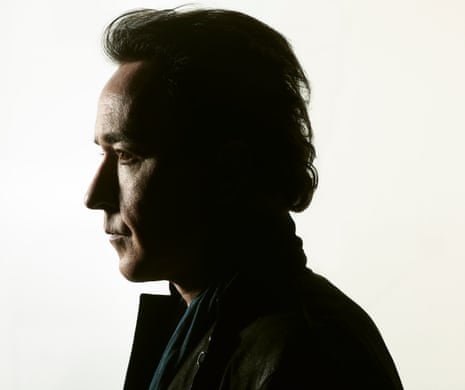Two o’clock, Chicago time. The curtains are down against a bright afternoon sun and John Cusack, who is by reputation a late riser, takes a seat at the breakfast counter in his kitchen. For decades this storied, experienced and rather solitary-seeming actor has dressed all in black. Today is no exception. He wears a black T-shirt, black bandana and a black leather biker’s jacket. But for the incongruous cup he’s drinking coffee from (a medieval-style flagon, large as a flowerpot) Cusack could be one of those menacing motorcycle dudes who parks himself next to you at an American dive bar and starts explaining, unbidden, how he once killed a man but in error.
He turned 54 in the summer. The voice is gravellier than when you knew it best, when Cusack was in his mid-30s heyday and playing those brilliant lovelorn everymen in Being John Malkovich (1999), High Fidelity (2000) and Serendipity (2001). The eyes, always so coolly narrowed when Cusack first made a name for himself as a teen star of the 80s, are more starey and tired these days. He rubs them a lot while he talks.
Professionally speaking, Cusack has been on a wearying run of form of late, the past five years a hotchpotch of underwhelming thrillers. (He hopes that a new Amazon TV drama he’s starring in, Utopia, will help revive his stock.) And politically speaking, as with so many who lean left, Cusack has been left exhausted by four years of a Trump presidency. The actor was online most of the day before, getting angry at news bulletins and tweeting strangers and friends – broadcasters, Edward Snowden, a librarian in North Carolina, a chocoholic in the UK – about the president’s latest outrages. “He’s an evil fuck,” Cusack growls, “and he grinds our faces in it every day.”
Back in 2012, when Cusack was awarded a star on the Hollywood Walk of Fame and a few of the people closest to him gave speeches, his sister Joan Cusack described his character as part It’s a Wonderful Life (melancholy, sweet), part Doctor Strangelove (eccentric, political). Kate Beckinsale, Cusack’s co-star in romcom Serendipity, described him as a “bit mysterious”. Defining himself in his Twitter bio, Cusack prefers the phrase “apocalyptic shit-disturber”. Whoever is most right, Cusack is an interestingly complicated guy, both opinionated and deferential, salty and sweet. Sometimes strangers will send him messages, suggesting that he leave politics alone, stay in his lane. “You have officially ruined Serendipity for me!” they say. Or: “You used to be one of my favourites!” Sometimes, Cusack will reply: “Aww. You’ll be OK.”
I ask him what he thinks about the idea that actors ought to stay in their lane, away from politics, and he takes a deep breath. (The “you” in the following speech can be taken to be directed at the person for whom Serendipity has been ruined.) “When you see children being ripped away from their mothers’ arms and put into kennels,” he says, “I’m sorry if you think someone speaking out against that is someone not staying in their lane. But let’s agree that, if you can’t figure out that that’s fascism, then we don’t have anything more to say to each other, and I don’t have any respect for you, and we should probably not talk. I mean!”
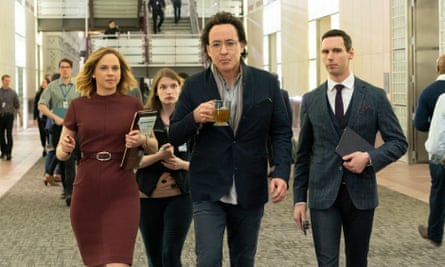
When I ask if he holds out much hope for a return to political normality after the November election, Cusack puffs out his cheeks and wags his head, weighing it. “One hopes that sanity comes back. But, um, America is a bat-shit-crazy place. So you just don’t know.”
And “you just don’t know” is the primary lesson a long career in Hollywood has taught him. A 30-plus-year veteran of the business, Cusack has known what it’s like to feel hot as an actor, and also what it’s like to feel the icy touch of irrelevance. When I ask about the difference between those two feelings, being hot and cold, Cusack pauses for a good long while and then says: “We-e-e-ell. I haven’t really been hot for a long time.”
Utopia, the show he hopes will warm him up, is colourful, breathless and vicious – a remake of Dennis Kelly’s Channel 4 hit, this time written by Gillian Flynn. It’s a multi-threaded drama that interweaves the stories of a gang of millennial comic-book readers, a pair of assassins and the sinister founder of a biotech company. Cusack, who can be peerlessly sinister when he wants to be (see his double turn in 2013, first as a serial killer in The Frozen Ground and then as Richard Nixon in Lee Daniels’ The Butler), plays the founder.
Followers of his Twitter feed will know the powerful aversion to the likes of Elon Musk and Mark Zuckerberg this actor has. When I suggest to Cusack it must have been cathartic, playing a founder-saviour type, and getting to channel his deep suspicions about Musk and the rest, he corrects me: “Yeah. They’re not really suspicions so much as they’re, um, factual observations.” His unease about the Silicon Valley founder class stretches back to the 00s and his time aboard Bill Clinton’s plane as part of a celebrity delegation to Africa. Musk was on the flight, too, as were Larry Page and Sergey Brin from Google.
“Too weird an adventure to pass up,” Cusack says, explaining his unlikely presence aboard. “It’s not like I’ve always been pure. No! I was the dog, and I was walked too. But then you start to see through it. You see these people saying, ‘Don’t be evil! We’re not evil!’ A nice catchy phrase. But then you see that their business becomes data-mining… You learn about what’s really happening with these companies. What their back doors are.”
His strong political views evolved from that trip, Cusack says. In recent years he has travelled to Russia with the novelist Arundhati Roy to meet American exile Edward Snowden – “Ed” – and show him support. He has been a full-blooded supporter of Bernie Sanders for a while now, and though he will vote for Biden in November Cusack insists he will do so grudgingly. (“You’re voting for an extension of the neoliberal order. But the alternative is fascism. You have to vote against Trump.”) A year ago his politics got him in trouble when he put out a tin-eared tweet that he meant as criticism of Israeli foreign policy but which was antisemitic. Cusack apologised. Recently, he took to the streets of Chicago during the Black Lives Matter protests, and got rushed by a gang of baton-wielding cops while he was taking photographs. “They didn’t hit me, they just… tuned up my Vespa. Whack-whack-whack!”
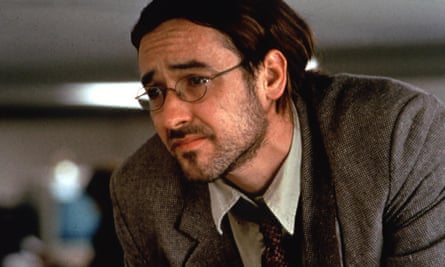
By queasy chance, part of the story of Utopia, which was written and filmed last year, involves a pandemic. It’s an accidentally timely subplot that Amazon has not been shy to push in trailers for the show. I ask Cusack, when he first read the script, whether it seemed at all plausible that something like this could happen, and he says yes: “Given the convergence of dystopian realities that we’ve had, whether it’s food and water shortages, endless war, global warming, it didn’t feel like it was too much of a stretch to imagine it happening. ‘Timely’ would be the wrong word, because that sounds like something that’s convenient and nice. But, for those people who have been Cassandras for a while, for those people who’ve been saying we must change, it feels like the rest of the world is catching up now.”
Do you consider yourself a Cassandra? Cusack rubs his eyes again. He smiles. He frowns. He appears to think, fuck it: “Sometimes you do. If you are saying things that people might not want to hear, or things that are annoying to hear… Y’know, yeah. A little bit!”
He’s gentler, honestly, than all this hoarse political speechifying makes him sound. He sister Joan once pointed out Cusack’s unconscious habit, at parties, of lowering his 6ft 2in frame to look someone shorter than himself in the eye: “To make them feel like the star.” Chatting as he sits in his kitchen, he isn’t so far away in manner from the affable, all-American boys he played so well in the 1980s. There was “Gib” Gibson in The Sure Thing (1985) and Lloyd Dobler in Say Anything (1989). As a viewer I first encountered Cusack when he played the wise and tragic college boy Denny Lachance in Rob Reiner’s bildungsroman, Stand By Me.
Reiner, who also directed The Sure Thing, was a former teen star himself. Cusack remembers the director going out of his way to make him feel welcome in an industry that could be cold and cruel to its young actors. “You don’t need me to repeat all the clichés. Hollywood can be quite transactional and rough. I was lucky. I was 16, 17. Rob would invite you into his home, look after you – it wasn’t that… exploitative vibe at all. Movies were definitely the Wild West back then. But there were good people, too.”
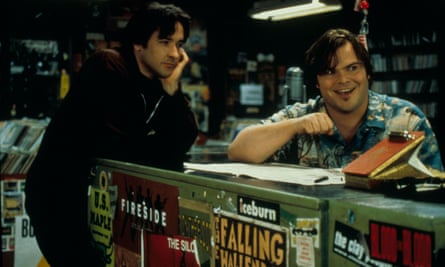
What does he remember of his first encounters with the rougher edges of the business? Cusack looks at the curtained window, holding in a smile, apparently wondering whether to tell the following story or not. “I remember, early in my career, when I was still in high school, you’d be on a movie set and at the end of the day people would go and get beer from the prop truck. And also you could get coke.”
He doesn’t mean the kind with a capital C: “Like I said, the Wild West. Not that I was doing it all. But it was just sort of like, ‘Wow.’ Sort of like, ‘OK! Anything goes.’”
After his breakout years in the 1980s he was in and out of work in the early 90s, till Woody Allen cast him in Bullets Over Broadway. Cusack found a cool groove towards the end of that decade, co-writing and starring in the cult comedy Grosse Pointe Blank and appearing alongside John Malkovich in the dementedly silly, but sort of brilliant, action movie Con Air. That film ended with an aeroplane full of condemned prisoners landing on a fully populated Las Vegas strip. (Incredibly, this is not the silliest scene Cusack has ever rendered for the action-movie canon. For that you need to check out the apocalypse movie 2012 and a sequence in which he drives a stretch limo through a collapsing Los Angeles skyscraper.)
His career high came right at the turn of the century, when he reunited with Malkovich for the unforgettable Charlie Kaufman/Spike Jonze collaboration Being John Malkovich and a year later starred in, co-wrote and co-produced the movie adaptation of Nick Hornby’s High Fidelity. In 2001 he did Serendipity, which has proved durable, a well-thought-of Christmas romcom. The later 00s were not quite so fertile for him and might be best thought of as Cusack’s “with hilarious results” phase. On IMDB they summarise the plot of 2005’s Must Love Dogs as follows: “A 30-something preschool teacher looks to the personals for a change of pace and a relationship, with hilarious results.”
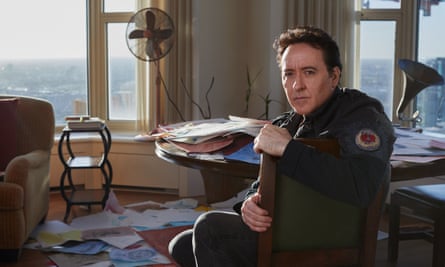
In 2010 he starred in and produced the self-explanatory comedy Hot Tub Time Machine, a silly film that found a cult audience and doubled its money at the box office. But it was one of the last of his projects to date that Cusack was able to get real money for. “In the last few years, I haven’t been able to get projects financed,” he says. “That could be a function of getting older. Or it could be a function of being cold.” Instead, the past decade’s work has been characterised by some ace bit-parts and cameos (an eerie psychotherapist in David Cronenberg’s Maps to the Stars, the musician Brian Wilson in Love & Mercy, a soliloquising preacher in Spike Lee’s Chi-Raq) as well as some terribly average thrillers, in almost all of which Cusack appears on the poster brandishing a gun or standing next to someone brandishing a gun.
“You may go make a film,” he sighs, lowering his torso over the breakfast counter, “you do all this work. And the movie sort of gets butchered in the editing room. And that happens, like…” (Cusack turns down his mouth, doing the sums) “like, nine times out of 10? So it’s not a very satisfying thing, if only one in 10 movies that you’re making work out the way they were planned.” Movie-making, he concludes, is “brutal, transactional, superficial and dumb.” Incredible, really, that he’s waited so long to get in on TV.
In all his years as an actor Cusack had never ventured further into telly than a 1996 guest-spot on Frasier, even as telly became an exciting, thriving, prestigious format, a refuge for so many forgotten or overlooked actors of Cusack’s generation. He has heard it said he was once considered for the role of Walter White in Breaking Bad. Even, that he was offered the gig and turned it down. The rumour has proved so persistent that Cusack finally had to sidle up to showrunner Vince Gilligan and ask. “I said: ‘I never got offered Breaking Bad, did I?’ And Vince said no.” The new Amazon show, Cusack insists, was his first serious offer. “One of those phone calls, they want you.”
And so he is waiting. For the show to come out (and maybe warm him up a little). For the presidential election in November, and the chance that Trump and his cronies will be ousted from power. All his adult life people have recognised Cusack, and tapped him on the shoulder, and said: I loved you in Say Anything (or High Fidelity, or Con Air). Sometimes a certain type of man, wary of looking soft, will insist it’s his wife who loves Cusack. Back in 2003, Cusack was at a boxing match in Las Vegas when he got one of these taps on the shoulder. “Hey, John,” said Donald Trump. “My wife loves you.” Cusack claims he shivered in revulsion even then.
When our interview is over he will be back online, barracking Trump, expressing his fury and his contempt. Before he goes I suggest to Cusack, gently as I can, that Twitter does not always look the healthiest place for him. “I would love to think about other things,” he agrees. “Poetry. Love. Anything else. But that’s just not the times we’re in. And, y’know, not all anger is just sort of somebody stuck in some rut in a basement. If you can’t be outraged on behalf of other people, or express anger at injustice, maybe that is its own rut. Sure, I might go too far sometimes. But I really just want to get across the message: that we’re sleepwalking into an incredibly dark possible future.”
Cusack rubs his tired eyes. He drinks from his big tin tankard of coffee. Who knows, he says? “Maybe being outspoken hurts your career… I’m just aware it helps me sleep better at night, knowing that I wasn’t passive during this time.”
Utopia is streaming now exclusively on Amazon Prime Video
